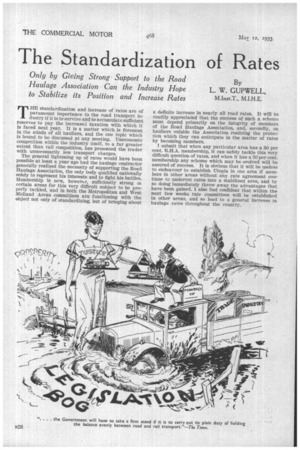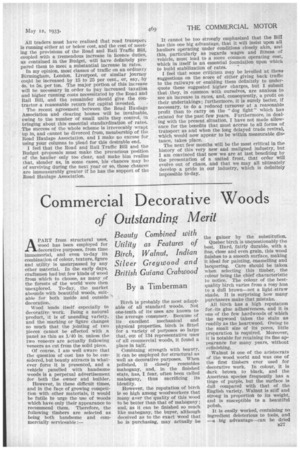The Standardization of Rates
Page 44

Page 45

If you've noticed an error in this article please click here to report it so we can fix it.
Only by Giving Strong Support to the Road By Haulage Association Can the Industry Hope L. W. GUPWELL, to Stabilize its Position and Increase Rates M.Inst.T., M.I.H.E.
THE standardization and increase of rates are of paramount importance to the road transport industry if it is to survive and to accumulate sufficient reserves to pay the increased taxation with which it is faced next year. It is a matter which is foremost in the minds of all hauliers, and the one topic which is bound to be discussed at any meeting. Uneconomic competition within the industry itself, to a far greater extent than rail competition, has presented the trader with unnecessarily low transport charges.
The general tightening up of rates would have been possible at least a year ago had the haulage contractor generally realized the necessity of supporting the Road Haulage Association, the only body qualified nationally solely to represent his interests and to fight his battles. Membership is now, howeNw, sufficiently strong in certain areas for this very difficult subject to be properly tackled, and in both the Metropolitan and West Midland Areas committees are functioning with the object not only of standardizing, but of bringing about
a definite increase in nearly all road rates. It will be readily appreciated that the success of such a scheme must depend primarily on the integrity of members of the Road Haulage Association, and, secondly, on hauliers outside the Association realizing the protection which they can anticipate in the matter of rates by becoming members.
I submit that when any particular area has a 30 per cent. R.H.A. membership, it can safely tackle this very difficult question of rates, and when it has a 50 per cent. membership any scheme which may be evolved will be assured of success. It is obvious that it will be useless to endeavour to establish Utopia in one area if members in other areas without any rate agreement continue to undercut rates into a stabilized area, and by so doing immediately throw away the advantages that have been gained. I also feel confident that within the next few weeks rate committees will be established in other areas, and so lead to a general increase in haulage rates throughout the country. All traders must have realized that road transporc is running either at or below cost, and the cost of meeting the provisions of the Road and Rail Traffic Bill, coupled with a tremendous increase in licence duties, as contained in the Budget, will have definitely prepared them to meet a substantial increase in rates.
In my opinion, most classes of traffic on an ordinary Birmingham, London, Liverpool, or similar journey could be increased by .15 to 25 per cent., or, say, by 4s. to 5s. per ton. The major portion of this increase will be necessary in order to pay increased taxation and higher running costs necessitated by the Road and Rail Bill, and the remainder should give the contractor a reasonable return for capital invested.
The recent agreement between the Road Haulage Association and clearing houses will be invaluable, owing to the 'number of small units they control, in bringing about this essential standardization of rates. The success of the whole scheme is irrevocably wrapt up in, and cannot be divorced from, membership of the Road Haulage Association, and I make no excuse for using your columns to plead for this desirable end.
I feel that the Road and Rail Traffic Bill and the Budget proposals must make the precarious position of the haulier only too clear, and make him realize that, slender as, in some cases, his chances may be of surviving during the next year or so, those chances are immeasurably greater if he has the support of the Road Haulage Association.
It cannot be too strongly emphasized that the BM has this one big advantage, that it will insist upon all hauliers operating under conditions closely akin, and this, particularly as regards wages and fitness of vehicle, must lead to a more common operating cost, Which in itself is an essential foundation upon which to build stabilization of rates.
I feel that some criticism may be levelled at these suggestions on the score of either giving back traffic to the railways or enabling them definitely to underquote these suggested higher charges, but I submit that they, in common with ourselves, are anxious to see an increase in rates, and, consequently, a profit on their undertakings; furthermore, it is surely better, if necessary, to do a reduced turnover at a reasonable profit than to carry on the "dog fight" which has existed for the past few years. Furthermore, in dealing with the present situation, I have not made allowance for the benefits that must accrue to all forms of transport as and when the long delayed trade revival, which would now appear to be within measurable digtance, takes place.
The next few months will be the most critical in the history of this very new and maligned industry, but I am convinced that now we are at last benefiting by the presentation of a united front, that order will evolve out of chaos, and that we may all ultimately develop a pride in our industry, which is definitely impossible to-day.




































































































